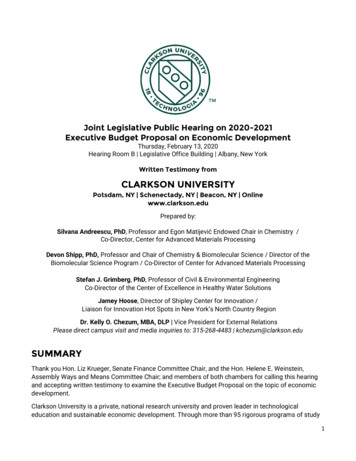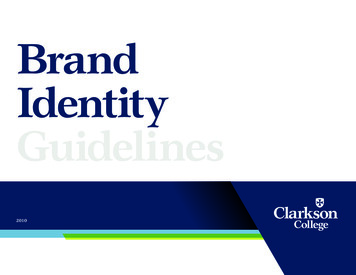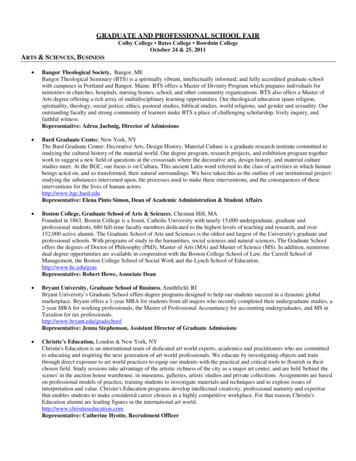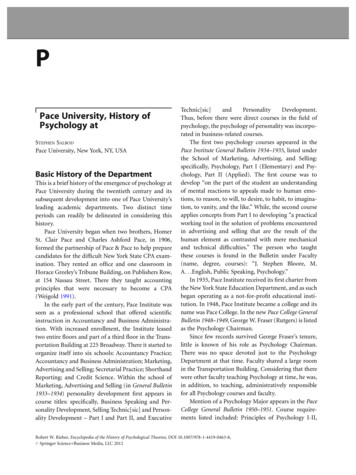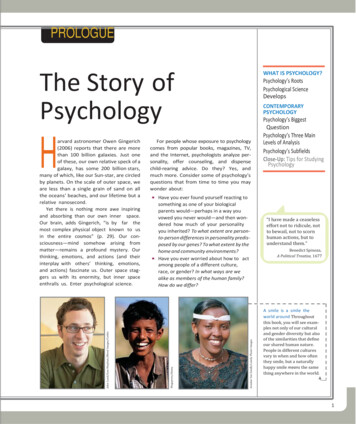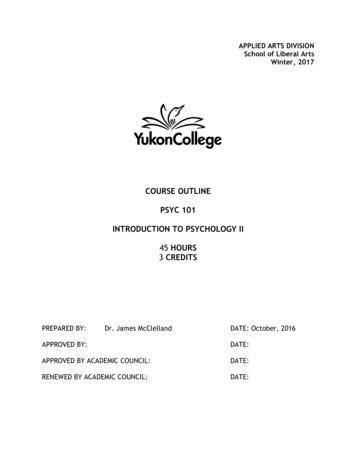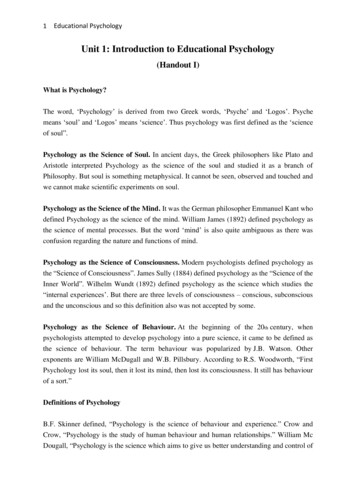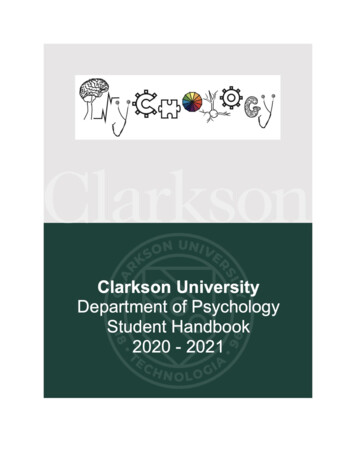
Transcription
PSYCHOLOGY HANDBOOKDEPARMENT OF PSYCHOLOGYCLARKSON UNIVERSITYI.General Information .3II.Introduction .3III.Why Study Psychology? .3IV.Careers in Psychology .4V.Internship and Research Opportunities .6VI.Requirements for the Psychology Major1. Clarkson Common Experience and free electives .2. Psychology Course Requirements . .3. Sample Curriculum .789Requirements for Psychology Minors and Concentrations1. Minor in Psychology .2. Minor in Cognitive Neuroscience .3. Minor in Biology, Behavior and Society .4. Professional Concentration in Health Psychology .10101112VIII.Psychology Course Descriptions .13IX.Advising Sheet23VII. . 2
I. GENERAL INFORMATIONWeb site: sychologyemail: awilke@clarkson.eduphone: 1-800-527-6577 ask for Psychology Department, or call (315) 268-2342Faculty: Associate Professor: Jennifer Knack, Lisa Legault, Andreas WilkeAssistant Professor: Lauren Petley, Elizabeth PienkosAdjunct Instructor: Gary KellyProfessor Emeritus: Robert DowmanMore information about the Psychology Department faculty can be found s/psychology/facultystaffII. INTRODUCTIONPsychology is the study of mind and behavior. Its explorations span an enormousbreadth, ranging from the activity of individual brain cells to the complex interactionsbetween individuals and society. Psychology investigates how people develop and learn;how we perceive the world; how relationships are formed; how stress affects our healthand impairs our performance; and why conflict is so much a part of the humanexperience. Psychologists also try to understand the nature and causes of abnormalityand search for effective treatments to relieve the suffering it causes.The Psychology program at Clarkson aims to provide each student with a solidfoundation in the fundamental areas of psychology, as well as the opportunities todevelop the problem solving, critical thinking, and communication skills that are criticalin the workplace. We also strive to help students find interesting and rewarding careersrelated to psychology. To this end, each Psychology major is given lots hands-on learningopportunities. These include the directed research, where the student works closely witha faculty member on an experiment of mutual interest; clinical internships, where thestudent works with a therapist in a clinical environment; and industrial/organizationalpsychology internships where, the student works with psychologists in business settings.III. WHY STUDY PSYCHOLOGY?Psychology graduates have a lot of valuable skills that can be applied to a wide varietyof careers. The most obvious skill is the basic understanding of human behavior andthought processes. However, the problem solving and communication skills thatPsychology majors develop during the course of their training are just as, if not more,important. These skills include being able to formulate a problem; acquire theinformation needed to solve the problem, either through researching the existingliterature or designing methods to collect new data; analyzing and interpreting theinformation (e.g., correctly applying statistics); integrating the information and applyingit to the problem; and communicating the solution to others, in either oral or writtenform. Importantly, Psychology majors know how to apply these skills directly to3
problems involving people. The Psychology degree at Clarkson is specifically designedto help students acquire these skills.IV. CAREERS IN PSYCHOLOGYThis section provides a very brief listing of the types of careers that are available toPsychology majors. For more detailed descriptions, visit the recent graduates page on ourweb site, and have a look at: T. L. Kuther & R. D. Morgan (2010) Careers in Psychology:Opportunities in a Changing World Boston MA: Wadsworth, Cengage Learning. We havecopies of this book in the Psychology office that you can borrow. Another very helpfulresource for career planning is R. N. Bolles (2012) What Color Is Your Parachute: A PracticalManual for Job Hunters and Career Changers, Berkeley CA: Ten Speed Press.Psychology is an excellent major for students interested in careers as lawyers, health careproviders (e.g., physician, physical therapist, physician assistant, occupational therapist),and business leaders (e.g., MBA). All of these areas require an ability to understand anddeal with people, problem solve, think critically, and communicate. These are skills thatall psychology graduates should have. There are also a wide variety of careers that aredirectly related to psychology. These include:1.Clinical Psychologists assess and treat people with psychological problems,such as anxiety and depression. Careers in this area require a graduate degreein Psychology.2.Counseling Psychologists foster and improve normal human functions acrossthe life span by helping people solve problems, make decisions, and cope withstresses of everyday life. Careers in this area require a graduate degree inPsychology.3.Developmental Psychologists study human development across the life span.Career opportunities with a bachelor’s degree include gerontology aide, childlife specialist, and non-profit organizations dealing with children.Opportunities with a graduate degree include scientist/practitioner, productdevelopment and media consultant, and social policy research.4.Educational Psychologists study how people learn, and develop the methodsand materials used to educate people of all ages. Recently there are increasingpossibilities in the military and industry for doctoral level educationalpsychologists. New opportunities in evaluation of social problems and policiesare opening for those with master’s degrees.5.Forensic and Legal Psychologists apply psychology in legal settings.Opportunities with a bachelor’s degree include police officer, correctionalofficer, probation & parole officer, juvenile detention worker, and forensicscience technician. Opportunities with a graduate degree include correctionalpsychology, forensic examiner, police psychologist, trial consultant, criminalprofiling, and political consulting.4
6.Health Psychologists are concerned with how psychological variables (e.g.,personality traits, stress, etc.) and social environments (e.g., family andcommunity support) affect both mental and physical health. Careersopportunities with a bachelor’s degree include recreational therapist,occupational therapy assistant, physical therapy assistant, and healtheducator. Opportunities with a graduate degree include research and teachingin academic settings, service delivery settings, and public health settings.7.Industrial/Organizational Psychologists are concerned with the relationshipbetween people and the workplace. There are 3 main areas in I/O Psychology:a.Consumer Psychologists help organizations understand how and whyconsumers choose certain products over others and to find out whatconsumers want. Career opportunities with a bachelor’s degree includeadvertising, real estate, retail, and public relations. Opportunities with agraduate degree include market research and product developmentconsultant.b.Environmental Psychologists study the interaction between people andtheir environments. This knowledge is applied to the design of the workplace, hospitals, schools, etc. to maximize productivity and efficiency,reduce stress, and minimize risks. Careers in this area require a graduatedegree.c.Human Resource Management. Human Resource Managers recruitemployees, provide training and development activities to helpemployees achieve their best, organize and implement performanceappraisals, ensure that employees and management practices conform togovernment regulations, and manage employee benefits andcompensation, employee records and personnel policies. Opportunitiesat the bachelor’s degree level include human resource generalist,recruiting and placement specialist, training and development specialist,and compensation and benefits specialist. Opportunities at the graduatedegree level include consultant and usability specialist.8.Neuropsychologists administer psychological tests to evaluate cognitive andbehavioral function following brain injury, and design and administerrehabilitation programs to help the patient regain function. This career tractrequires a doctoral degree in Neuropsychology.9.Psychometrics, Quantitative, & Experimental Psychologists are concernedwith methods and techniques used in acquiring and applying psychologicalknowledge. Career opportunities at the bachelor’s degree level includeinsurance underwriter, computer programmer, computer support specialist,and budget analyst. Opportunities at the graduate degree level include5
operations research analyst, computer systems analyst,administrator, actuary, financial analyst, and data mining.database10. School Psychologists are concerned with the intellectual, educational, socialand emotional development of children. Opportunities at the bachelor’s levelinclude teacher, childcare worker, teaching assistants, and early childhoodbehavioral specialist. Opportunities at the graduate degree level includeschool psychologist and school counselor.11. Sports Psychologists help athletes perform their best. This can beaccomplished by teaching the athlete visualization techniques, stressmanagement, and team building skills. Sports Psychologists also work withcoaches helping them become better at leading and motivating teams.Opportunities at the bachelor’s degree level include fitness instructor,recreational worker, physical education teacher, sport instructors, coaching,and sport reporting. Career opportunities at the graduate level includeresearch and teaching in academic settings, and private practice/consulting.V. INTERNSHIP AND RESEARCH OPPORTUNITIESEach psychology major has the opportunity to apply knowledge gained in the classroomthrough the directed research and internship courses. In the directed research studentswork one-on-one with faculty members on a research topic of mutual interest. A list ofour faculty and their research interests can be found s/psychology/faculty-staffFor students interested in pursuing careers in clinical psychology, there are a number ofclinically-oriented internships, including the Ogdensburg Psychiatric Facility, the CantonPotsdam Hospital Substance Abuse Detoxification and Rehabilitation Unit, New YorkARC, Renewal House, and the Reachout Crisis hotline. Business-related internships arealso available at local businesses and at Clarkson’s Human Resources Department.Students can also develop their own internship experience either in Potsdam, at homeover the summer, or elsewhere. Indeed, the internship could involve any worker orvolunteer experience that is related to Psychology. Check with your advisor for details.Please see the syllabi for PY496 (Directed research) and PY400/401/402/403 (Internship)for further details. Your academic advisor can provide you with a copy of them.6
VI. REQUIREMENTS FOR THE PSYCHOLOGY MAJOR1. Clarkson Common Experience and Free ElectivesA.Clarkson Common Experience - 39 credit hours (required for all majors at theUniversity)The Clarkson Seminar (3 credits)First Year Seminar (1 credit)Technology Serving Humanity (3 credits)3 courses in Mathematics (numbered 100 or above - one of which has to be Calculusand one Statistics (9 Credits)2 courses in Natural Science – one of which has to include a lab (8-9 credits)5 courses covering at least the 4 of the 6 knowledge areas (15 credits)B.Psychology Course Requirements – 32 credit hoursThe 11 Psychology courses required for the major are described below.C.Free Electives – 49 credit hoursThe psychology major allows room for 49 elective hours. These electives can comefrom any aspect of the university including Psychology. The flexibility of the majoroften allows a student to complete the requirements for another major in the four yearspan. Such double majors are valuable in today's job market. The department will tailora program for those students interested in double majoring. Our goal is to meet eachstudent's individual needs, interests, and career goals.7
2. Psychology Course RequirementsRequired – (must take all)PY151 Introduction to PsychologyPY253 Social PsychologyPY255 Cognitive PsychologyPY456 Experimental PsychologyPY457 Experimental Psychology LabResearch/Internship Requirement – (must take 1)Directed Research (PY496)Internship (select 1 from PY400, PY401, PY402, PY403)Physiological requirement – (must take 1)PY/BY454 PhysiologicalPY/BY458 Cognitive NeurosciencePY/BY460 NeurobiologyCognitive requirement – (must take 1)PY/BY358 Animal Learning and CognitionPY/BY357 Human Cognitive EvolutionPY/BY359 PerceptionPY360 Learning and MemoryPY461 Judgment and Decision MakingElectives- selected from the above and following courses – (must take 3)PY246 Educational PsychologyPY480 D.S. in PsychologyPY286 Organizational BehaviorPY481 D.S. in Social PsychologyPY310 Human SexualityPY482 D.S. in Physiological PsychologyPY311 CyberpsychologyPY483 D.S. in Cognitive PsychologyPY315 Personal RelationshipsPY491 Dir. Res./Health PsychologyPY317 The Psych of Psychoactive DrugsPY492 Dir. Res./PsychophysiologyPY319 Current Readings in Animal BehaviorPY493 Dir. Res./Cognitive PsychologyPY321 Consumer BehaviorPY494 Dir. Res./Social PsychologyPY335 PersonalityPY495 Dir. Res./Clinical PsychologyPY340 Behavioral Ecology & SociobiologyPY900 Thesis/Dissertation in PsychologyPY361 Motivation and EmotionPY363 Judgement and Decision Making forthe Biomedical SciencesPY370 Developmental PsychologyPY372 Community PsychologyPY411 Counseling PsychologyPY412 Psychiatric Center Professional ExperiencePY453 Advanced Topics in Social PsychologyPY459 Neuroscience and SocietyPY462 Abnormal PsychologyPY463 Health PsychologyPY464 Clinical Psychology8
3. Psychology Major Sample CurriculumFreshman ion to PsychologyNatural Science electiveClarkson SeminarIntro. College MathCCE first year eCognitive PsychologySocial PsychologyCalculusNatural Science electiveNatural Science elective labcrhrs3333214Sophomore YearFallcoursePYTitleStatistics (STAT 282 or 318)PY electiveKnowledge Area 1free electiveSpringcrhrs3633coursePYPYTitlePY electivePY Cognitive electiveKnowledge Area 2free elective15crhrs333615Junior YearFallcoursePY456PY 457TitleExperimental PsychologyExperimental Psychology LabKnowledge Area 3free electiveSpringcrhrs3238courseTitlePY Physiological electiveFree electiveKnowledge Area 4free elective16crhrs333615Senior YearFallcourseTitlePY directedresearch/internshipknowledge area 5free electivesSpringcrhrscourse339Titlecrhrsfree electives151515total credits1) The Professional & Professional Experience requirements are met by PY456 and the directed research/internship courses.2) The Technology Serving Humanity requirement is met by PY456.3) The Information Technology requirement is distributed throughout the Psychology Curriculum.9120
VII. REQUIREMENTS OF THE PSYCHOLOGY MINORS ANDCONCENTRATIONS1. Minor in Psychology (18 credits)PY151 – (Introduction to Psychology) and any 5 PY courses numbered 200 or above (only oneof which can be the directed research or internship).2. Minor in Cognitive NeuroscienceCognitive neuroscience is the study of the physiological and biochemical mechanismsunderlying higher order human cognitive processes, such as attention, memory, perception,and emotion. The Cognitive Neuroscience minor will be of interest to students pursuingcareers in the clinical health sciences (medicine, physical therapy, clinical psychology,neuropsychology) and those wishing to do basic and applied research on the central nervoussystem.REQUIREMENTSRequired Basic Science Courses (29 cr)PY151 Introduction to Psychology (3 cr)BY140 Biology I: Inheritance, evolution and diversity (3 cr)BY142 Biology I Laboratory (2 cr)BY160 Biology II: Cellular and Molecular Biology (3 cr)BY162 Biology II Laboratory (2 cr)CM131 General Chemistry I (4 cr)1CM132 General Chemistry II (4 cr)1PH141 Physics for Life Sciences I (4 cr)2PH142 Physics for Life Sciences II (4 cr)2Required Cognitive Neuroscience Courses (9 credits)BY/PY458 Cognitive Neuroscience (3 cr)BY/PY454 Physiological Psychology3 (3 cr)BY/PY460 Neurobiology (3 cr)Elective Psychology Courses: 2 courses (6 credits) chosen from the following:PY317 Psychology of Psychoactive Drugs (3 cr)BY/PY358 Animal Learning and Cognition (3 cr)PY/BY357 Human Cognitive Evolution (3 cr)BY/PY359 Perception (3 cr)PY360 Learning and Memory (3 cr)PY462 Abnormal Psychology (3 cr)PY463 Health Psychology (3 cr)Elective Biology Courses: 2 courses (6 cr) chosen from the following:BY360 Physiology (3 cr)BY214 Genetics (3 cr)BY430 Developmental Biology (3 cr)BY350 Comparative Anatomy (3 cr)BY471 Anatomy and Physiology I (3 cr)BY472 Anatomy and Physiology II (3 cr)BY480 Advanced Cell Biology1CM103/105 and CM104/106 will also satisfy the Chemistry requirementPH131 and PH132 will also satisfy the Physics requirement3Biology majors taking the cognitive neuroscience minor cannot use PY/BY454 as one of their Biology elective courses.210
3. Biology, Behavior, and Society minorA minor in Biology, Behavior, and Society is available to students in all degree programs. To obtaina minor, students must complete 20 credits:Required courses (11 cr):HIST270 Introduction to Culture, Society & Biology (3 cr)BY/PY340 Behavioral Ecology and Sociobiology (3 cr)BY/PY357 Human Cognitive Evolution (3 cr)SA&S300 Arts and Sciences Seminar (1 cr)SA&S499 Biology, Behavior and Society Minor Portfolio (1 cr)Electives (9 cr): Electives must be from outside your declared major, and include at least threecredits from each of the two categories:Category 1ANTH220: Understanding the Americas (3 cr)ANTH225: Global Perspectives on Sexuality (3 cr)ANTH230 Introduction to Race and Ethnicity (3 cr)ANTH270 Environment, Technology and Society (3 cr)ANTH325: Sex and Commerce (3 cr)HIST320: Medicine and Society in America (3 cr)HIST326: Modern Sex (3 cr)HIST327: History of Women in America (3 cr)HIST328: History of Gender and Sex (3 cr)HIST329: History of the American Family (3 cr)HIST342: War and Gender (3 cr)HIST350: History of Nazi Germany (3 cr)HIST351: History of the Holocaust (3 cr)SOC330: Health, Wealth, Inequality and the Environment (3 cr)POL/SOC350: International Development and Social Change (3 cr)SS220 Introduction to Gender (3 cr)Category 2BY/PY319 Current Readings in Animal Behavior (1 cr)BY/PY358 Animal Learning and Cognition (3 cr)BY460 Neurobiology (3 cr)BY420 Evolution (3 cr)EC384 Game Theory and Economic Strategy (3 cr)HIST/PY459 Neuroscience and Society (3 cr)OS286/PY286 Organizational Behavior 1 (3 cr)PY253 Social Psychology (3 cr)PY310 Human Sexuality (3 cr)PY315 Personal Relationships (3 cr)PY360 Learning and Memory (3 cr)PY453 Advanced Topics in Social Psychology (3 cr)PY461 Judgment and Decision Making (3 cr)PY463 Health Psychology (3 cr)11
4. Professional Concentration in Health PsychologyThe Professional Concentration in Health Psychology is aimed at Psychology majors interested incareers in health science. The Professional Concentration in Health Psychology can be obtainedby completing any 6 of the courses listed below (18-21 credits). Note that 3 of these courses mustbe used as undesignated free elective courses and cannot be used for the Psychology major.PY454 Physiological PsychologyPY458 Cognitive NeurosciencePY463 Health PsychologyPY310 Human SexualityPY317 The Psychology of Psychoactive DrugsPY462 Abnormal PsychologyPY253 Social PsychologyPY361 Motivation and EmotionPY360 Learning and MemoryPY412 Psychiatric Center Professional Experience12
VIII. PSYCHOLOGY COURSE DESCRIPTIONSPY151 Introduction to Psychology (IG) 3 creditsEmphasizes the scientific study of the human mind. Appropriate research methods andphilosophical questions will be considered. Topics include the brain, memory, perception,development, personality, social behavior, emotion, motivation, psychological disorders,stress, and states of consciousness.PY246 Educational Psychology 3 creditsPrerequisite: PY151 or consent of instructorThis course will examine the ways in which theories of child development and learninginform classroom teaching methods, assessment, behavioral interventions, and studentmotivation.PY253 Social Psychology 3 creditsPrerequisite: PY151Emphasis on the relative influences of society and other people on the individual. Topicsinclude persuasion, attitude formation and change, group decision making, prejudice,social influence, altruism and aggression. Fundamental to the discussion of each topic isthe scientific research that underlies it. A focus of the course is the means by which theindividual can influence and be influenced by the organizations that play a major role inour livesPY255 Cognitive Psychology 3 creditsPrerequisite: PY151Investigates mental processes involved in perception, attention, memory, language,thinking and problem solving. The relationship between these processes and brain activityand artificial intelligence will also be discussed.PY286 (OS286) Organizational Behavior I (IG) 3 creditsAn introduction to the processes required to manage contemporary organizations with afocus on individual behaviors as they relate to the functions of planning, organizing,controlling, and leading. The most recent concepts of behavioral science in the practiceof management are presented to assist the student in gaining understanding of thepervasiveness of the discipline in all types of organizations and processes. Topics includemotivation, leadership, perceptions, personality theory, learning theory, personnel issues,stress management, organizational culture, and decision making.PY310 Human Sexuality (UNIV: CGI/IG) 3 creditsThe course objective is to provide an informed perspective on human sexual behavior.Topics include anatomy and physiology, contraception, sexually transmitted diseases,sexual development and identity, varieties of sexual behavior across cultures and species,disorders and difficulties of sexual expression, therapeutic issues on the treatment of13
sexual disorders and the role of sex in interpersonal relationships. Offered springsemester. Requirement Designation: Social Science.PY311 Cyberpsychology 3 creditsPrerequisite: PY 151Cyberpsychology is the branch of psychology that examines human behavior in thecontext of interaction with modern technologies. The research in this field is primarilyfocused on the use of Internet, particularly social media sites, but other technologies, suchas gaming, mobile device applications, artificial intelligence and virtual reality are alsowithin the scope of this area of psychological research and practice. The goal of this courseis to provide students with an in-depth understanding of the psychological factorsassociated with using technologies and interacting in on-line environment.PY315 Personal Relationships (C1) 3 creditsPrerequisites: PY151 or Junior or Senior standingAccording to some statistics humans spend as much as 60% of their lives in the companyof others. This course will focus on research and theory in the psychology of personalrelationships. Characteristics of romantic, marital, family and other social relationships willbe considered. Topics will include attraction, relationship development and maintenance,communication, social support, and relationship conflict.PY317 The Psychology of Psychoactive Drugs (UNIV: CGI/IG) 3 creditsThe Psychology of Psychoactive Drugs will examine a number of medicinal and so-calledrecreational drugs that affect consciousness, including cocaine, morphine, LSD, marijuana,alcohol, nicotine and caffeine. The course will include a description of the drugs, theirpharmacological action, and side- effects.Psychological, physiological, andpharmacological theories of tolerance and addiction, and addiction treatment programswill also be covered.BY 319 Current Readings in Animal Behavior 1 creditPrerequisites: BY222 or PY 151The field of animal behavior is a rapidly advancing one, especially at the interface ofneurobiology and cognition, and the interface of cognition and functional analysis ofbehavior (behavioral ecology and sociobiology). This one credit hour course is designed asa 'journal club' with a focus on the latest developments in theory and empirical researchon animal behavior. The course is intended for any student who has a sincere interest inintegrative animal behavior.PY321 (MK321) Consumer Behavior 3 creditsPrerequisites: MK320Extensive coverage of selected consumer behavior theories and models. Special emphasisgiven to the most recent research along with marketing mix applications. Topics includeclassic and operant conditioning, motivation and attribution theories and the elaborationlikelihood model. Students are required to complete a term project.14
PY335 Personality Psychology 3 creditsPrerequisites: PY151, Junior or Senior standing, or permission of the instructor.Personality theories provide a framework with which to understand a person'sdevelopment, motivation and behavior. This course examines traditional andcontemporary approaches to personality, focusing on theoretical and empirical advancesfrom the psychoanalytic, trait, behavioral, cognitive and phenomenological perspectives.PY340 (BY340) Behavioral Ecology and Sociobiology (IG) 3 creditsPrerequisites: BY140 or PY151 or consent of instructor.This course is concerned with the adaptive functions of animal behavior, emphasizingecological and evolutionary perspectives. Topics covered include foraging behavior, sexualselection, social systems, parental care, and cooperation and conflict. One major focus willbe on evaluating the arguments of proponents and critics of sociobiology on whether thefields are useful at explaining human behavior.PY357 (BY 357) Human Cognitive Evolution 3 creditsPrerequisites: PY 151 or junior or senior standingEvolutionary psychology is concerned with the adaptive problems and selective pressuresour ancestors encountered in their environments, the psychological mechanisms thatevolved to help them solve those problems, and the way those evolved mechanismsfunction in current environments. This way of thinking about the brain, mind, and behavioris changing how scientists approach old topics, and is opening up new ones. This coursewill focus on current developments and selected topics in evolutionary psychology (e.g.,foraging, mate choice, parental investment, cooperation and culture) and explore theevolution of cognition from a broad comparative perspective.PY358 (BY 358) Animal Learning and Cognition 3 creditsPrerequisites: BY140 or PY151 or consent of the instructor.This course focuses upon how animals acquire, process, store and recall information abouttheir environment and social partners. Topic that will be examined include how animalsperceive and classify stimuli; how they learn and remember; how they orient and navigate;how they measure time, number, and amount; how they acquire abstract concepts; howthey perceive social relationships; and how they communicate. A diversity of invertebrateand vertebrate organisms will be included (sea slugs to primates!), and there will be anemphasis on understanding taxon-specific specializations as well as general patternsacross animals.PY359 (BY359) Perception 3 creditsPrerequisites: PY151 or Junior or Senior standingPerception deals with our conscious experience of the world, ourselves and each other.This course will examine how perceptions are measured (psychophysics); how visual,auditory, touch and pain sensory stimulation is actively organized into consciousperceptions; developmental aspects of perception; the role of cognitive factors, such asattention; and how altered conscious states (e.g., achieved through meditation,hallucinogenic drugs) affect perception. Fundamental principles of perception discussed15
in this course will be used to explain how we experience the world, ourselves, and eachother.PY360 Learning and Memory 3 creditsPrerequisites: PY151 or Junior or Senior standingThe basic principles, major theories and practical applications of learning and memoryprocesses will be explored in humans and animals. Topics will include how knowledge isacquired (learning), how it is represented, stored and accessed (memory), and how theselearning and memory principals can be applied in education and in treating psychologicaldisorders.PY361 Motivation and Emotion 3 creditsPrerequisites: PY151 or Junior or Senior standingThis course examines the forces of personality, environment, and culture that lead peopleto want what they want, and do what they do. Motivation will be explored in the contextsof education, work, therapy, sports, and relationships. Topics include: self-efficacy, selfregulation, learned helplessness, intrinsic and extrinsic motivation, achievementmotivation, goal-setting, implementation intentions, self-determination, and emotion.Recent developments in the field of motivation will be applied to the practice of motivatingothers.PY363 Judgement and Decision Making for the Biomedical Sciences 3 creditsPrerequisites: Student enrolled in Trudeau semester experienceDecision making is using information (and in some cases emotion) to guide behavior amongmultiple possible courses of action—for example, which foods to choose, which stocks toinvest in, who to select for a romantic partner, or which products to buy. These choicesdetermine our success in meeting the challenges of life. This cour
PSYCHOLOGY HANDBOOK DEPARMENT OF PSYCHOLOGY CLARKSON UNIVERSITY . Career opportunities with a bachelor’s degree include gerontology aide, child life specialist, and non-profit organizations dealing with children. Opportunities with
